Get Clued In: What Is Fixed Wireless Internet & How It Works?
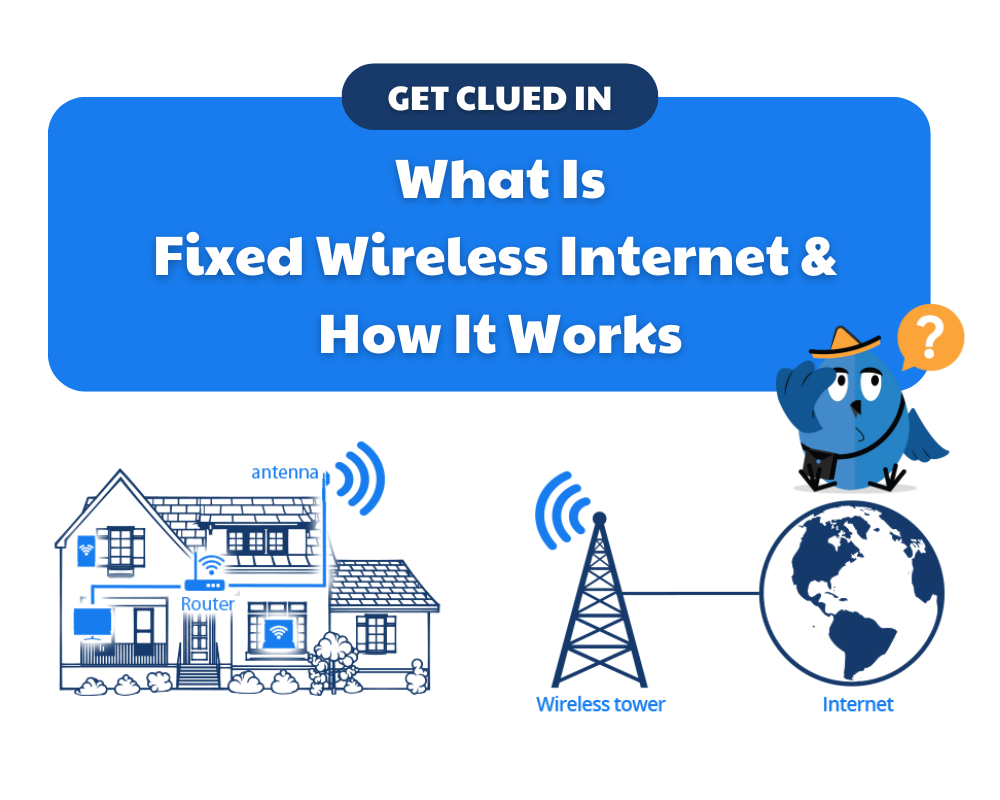
In a Nutshell Summary
In this insightful exploration, we dive into the essence of what is fixed wireless internet, explaining its mechanics, benefits, and how it contrasts with other broadband services, so you can determine if it’s the ideal choice for you.
Bullet Point Summary:
- Discover what fixed wireless internet is and how it operates through line-of-sight technology.
- Learn the advantages of fixed wireless, including speed and ease of installation.
- Compare fixed wireless with other broadband options, examining the unique benefits and potential drawbacks.
- Evaluate the cost and practical applications of fixed wireless, particularly for businesses and remote areas.
- Address common questions about fixed wireless, including the impact of weather and installation considerations.
1. Introduction: The Real-World Impact of Fixed Wireless Internet
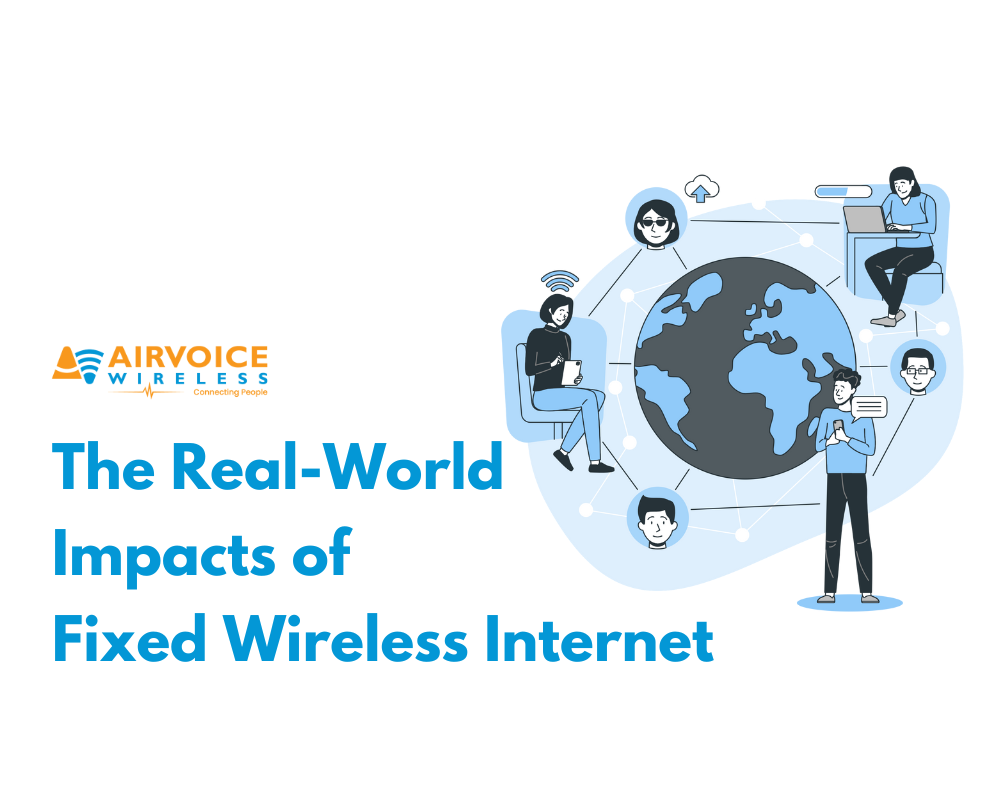
The Rise of Fixed Wireless in the Age of Connectivity
Fixed wireless internet has become a critical player in closing the connectivity gaps that persist in many rural regions. As demands for high-speed internet escalate, fixed wireless presents an innovative solution, rendering previously under-served areas with reliable and fast connectivity. Not reliant on the extensive cabling required by traditional broadband, fixed wireless leverages the power of existing cellular networks to offer a cost-effective and scalable option. Its deployment is notably expedient, a factor contributing to its burgeoning popularity among communities that previously lacked adequate internet access.
Fixed Internet vs State Internet
The terms “fixed internet” and “state internet” might cause some confusion as they are not standard industry terminology. Generally, “fixed internet” refers to any broadband service that provides internet connectivity to a fixed location as opposed to mobile alternatives. This includes both wired solutions like DSL, cable, or fiber optics, as well as wireless setups such as fixed wireless internet where a stationary receiver on your property communicates with a nearby base station.
On the other hand, “state internet” isn’t a recognized type of internet service. It could potentially be a reference to internet services provided by the state, such as state-funded broadband initiatives aimed at extending infrastructure to underserved areas. Alternatively, it might be an auto-correct or misinterpretation of “satellite internet,” which, unlike fixed wireless, uses a satellite in orbit to connect users to the internet and can be accessed from almost any location. While fixed internet is location-dependent and generally offers steadier speeds, satellite internet can be more prone to latency but provides broader coverage.
2. Unraveling the Mechanics of Fixed Wireless Internet
From Base Station to Receiver: How Your Signal Travels
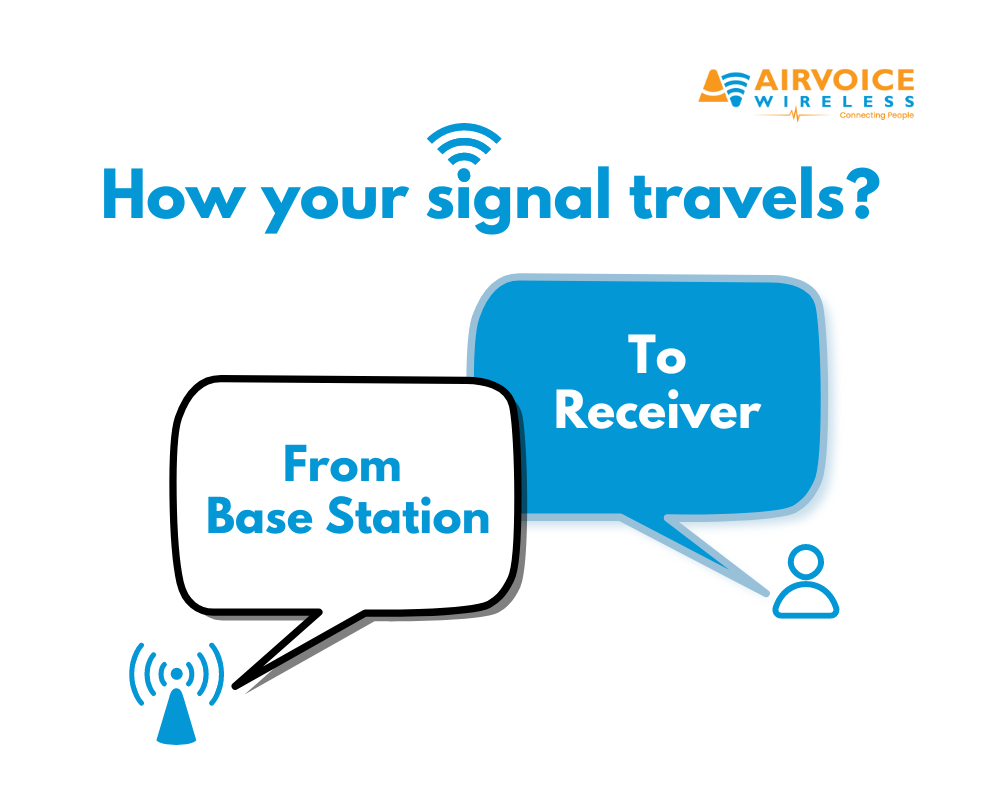
The journey of wireless network signals in a fixed wireless setup begins at the base station, where the provider possesses a large antenna strategically positioned to disseminate the signal over long distances. Acting like a powerful wireless access point, the base station sends data through radio waves to your specific receiver, often a smaller antenna or dish located on your property.
This direct communication path, often relying on a cable modem, is crucial for ensuring a robust and reliable connection. Once the signal reaches your home’s antenna, it is typically transferred via a cable to your interior network equipment, such as a wireless router. This router then distributes the internet connection wirelessly to various devices within your household, enabling you to stream, browse, or work online with ease.
The performance of this signal depends on the direct line of sight, absence of obstructions, and the distance from the base station to your receiver. Understanding this path can help you optimize your setup for the best possible internet service.
The Role of Line-of-Sight Technology in Connectivity
Line-of-sight technology is essential for fixed wireless internet, requiring a clear, direct path between the subscriber’s antenna and the service provider’s base station. Obstacles like buildings, trees, or hills can block the signal, so a clear aerial path is often needed for the best installation.
However, new technologies can sometimes help create a line of sight even with obstacles. Providers may use reflective technologies or place the receiver on a high point like a building or tree to catch the signal indirectly. Despite these advancements, a clear line of sight is still crucial for the best and most stable fixed wireless internet connection.
3. Unlocking the Mysteries: What is fixed Wireless Internet?
What is a fixed Wireless Internet?
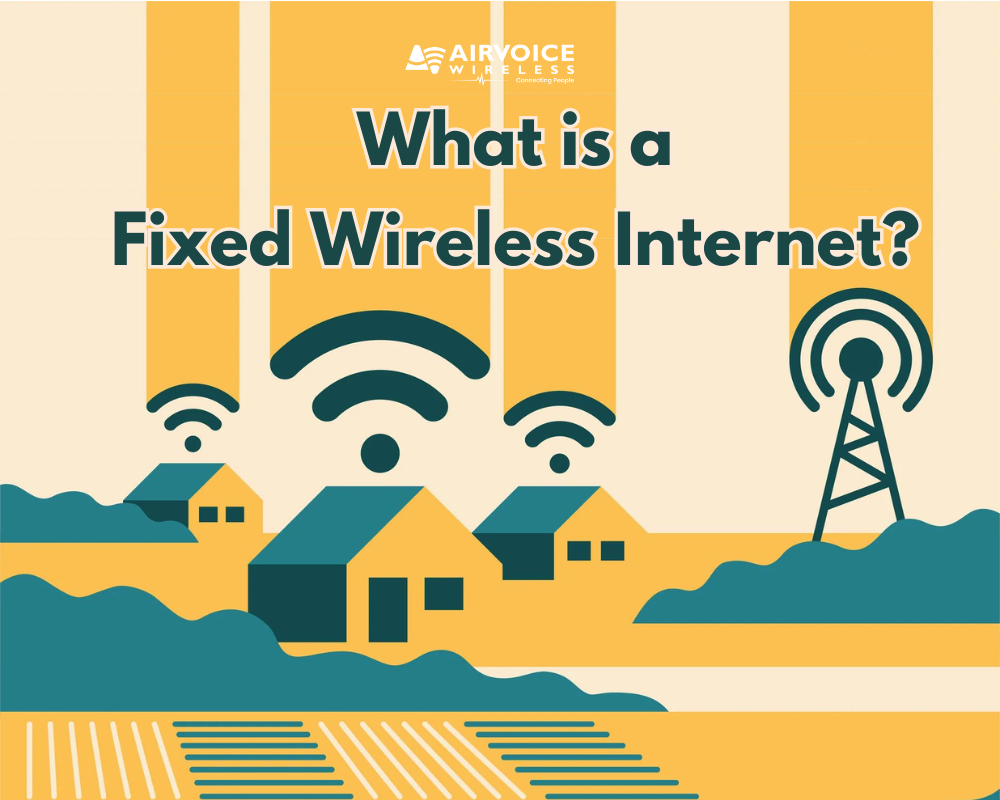
Fixed wireless internet is a growing choice for broadband connections, using radio waves to provide internet access. It works by creating a direct link between a base station, usually a transmission tower with antennas, and a receiver, like an antenna or dish, at the user’s location. This technology transmits data through the air, eliminating the need for physical wires like copper or fiber-optic cables.
Fixed wireless technology relies on a clear line of sight for a strong, uninterrupted connection. Signals travel in a straight line from the base station to the receiver, so obstacles like buildings, trees, or terrain can interfere with or block the signal. To avoid this, receivers are often placed in high locations, like rooftops, to ensure a clear path to the tower. Because the receivers are stationary, the connections can be precisely aimed, leading to a stronger signal.
Fixed wireless internet provides varying speeds depending on the distance from the transmission tower, the number of users at the same time, and the quality of the equipment. While weather can affect the signal, fixed wireless is generally more stable than satellite internet, although severe weather can still cause disruptions. With its focus on direct point-to-point communication, users can often experience relatively high-speed connections, though this can vary due to environmental and technical factors. The speeds and reliability of fixed wireless internet are competitive with traditional DSL and cable, especially when using lower frequencies that are less prone to interference.
How does fixed Wireless Internet work?
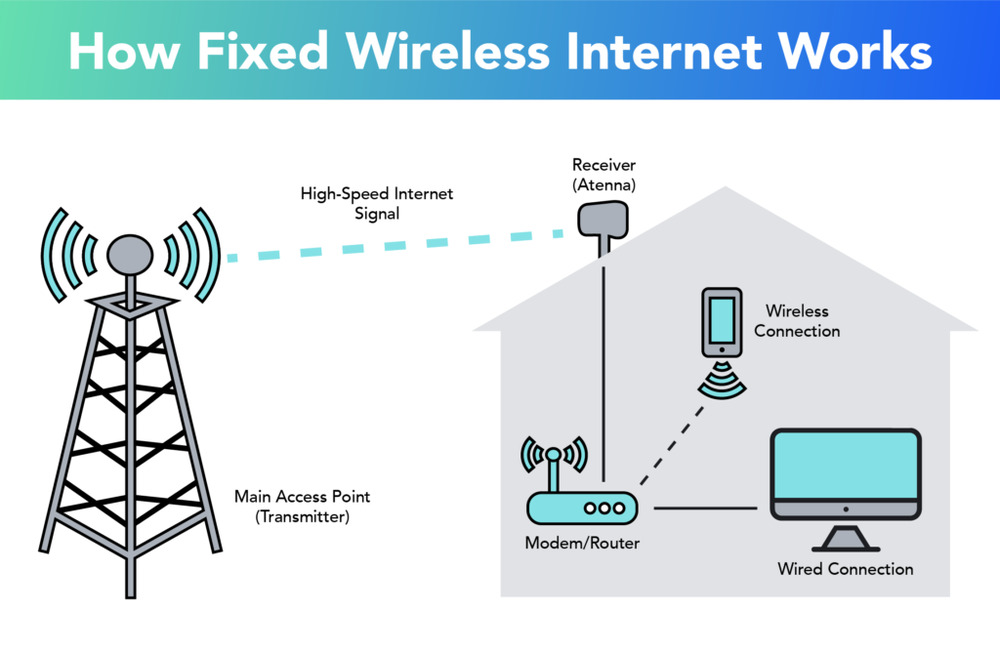
Due to fixed wireless internet operating by using radio waves transmitted from a local base station to a fixed location—your home or business. Here’s a simple breakdown of how it works:
- The process begins at a main access point that’s usually connected to the internet via high-speed fiber-optic lines.
- Via a powerful antenna at the access point, these internet data signals are sent out as radio waves.
- These radio waves then travel to a smaller antenna specifically installed at your fixed location, also known as the subscriber module (SM).
- The subscriber module captures these signals and sends them through a cable to a router inside your property.
- This router then converts the signals into internet access for your devices, providing you with wireless broadband service.
This form of internet service is particularly effective in areas where laying cables is challenging or not cost-effective. Fixed wireless offers a potent alternative to both wired and satellite services, typically providing faster speeds and lower latency. Importantly, this type of internet requires clear line-of-sight connectivity between the base station and the fixed location antenna to maintain a strong and stable signal.
Is fixed wireless internet slow?
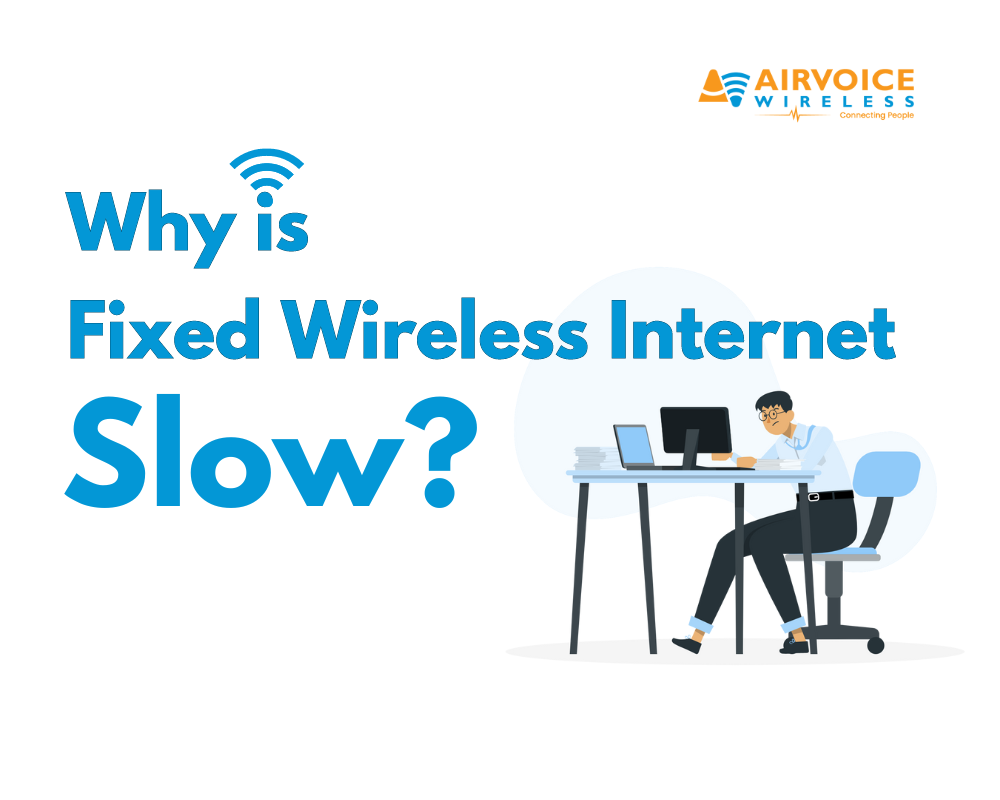
Fixed wireless internet speed can vary, but it is by no means inherently slow. Many fixed wireless networks deliver broadband speeds that are comparable to or even exceed wired connections like DSL, especially when utilizing 5G technology. Speeds can range widely depending on the service provider, equipment used, and proximity to the base station.
Typically, users can expect speeds that support everyday online activities such as streaming high-definition videos, gaming, and teleconferencing. What is 5G fixed wireless, why not? The incorporation of 5G standards into fixed wireless setups has particularly been a game-changer, bringing increased speeds and reduced latency, pushing the performance closer to that of high-end broadband connections. It is crucial for potential subscribers to check with local providers for specific speed offerings and to ensure their locality is well-covered by the service’s network.
What is 5G fixed wireless access?
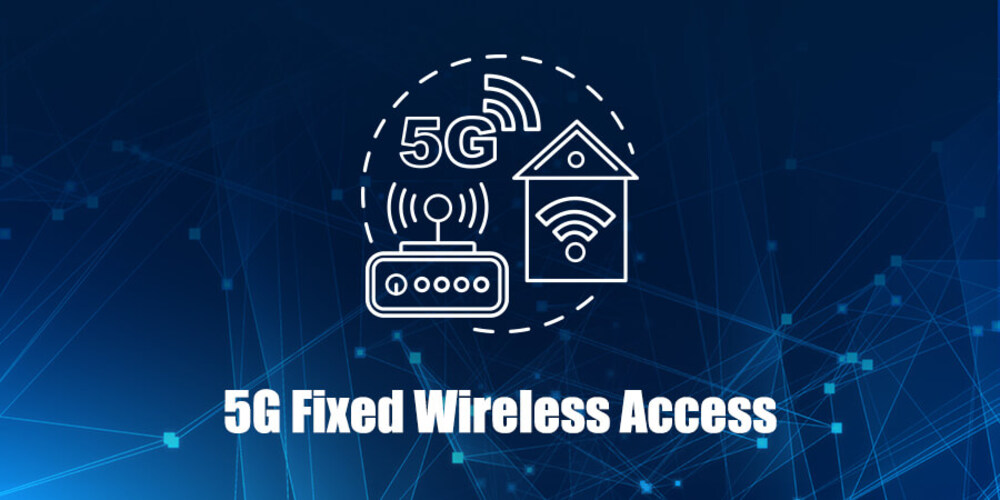
5G fixed wireless access (FWA) is a new way to provide high-speed internet using the latest mobile technology. Here’s why it’s special:
- 5G FWA offers much faster speeds, lower delays, and higher capacity than earlier generations, making it a strong competitor to traditional cable-based broadband.
- By using advanced 5G features like higher frequency bands and new signal techniques, FWA can deliver internet at multi-gigabit speeds.
- It’s perfect for areas where installing fiber-optic cables is difficult, providing a quick and efficient way to bring high-speed internet to homes and businesses.
- The setup is easier and faster than wired broadband because it only needs a 5G-compatible receiver at the user’s location.
- 5G FWA is important for closing the digital gap, offering a practical way to connect underserved or rural communities to reliable internet services.
4. Advantages of Choosing Fixed Wireless
Speed and Reliability: Performance Breakdown
Fixed wireless internet, a key aspect of wireless networking, has made significant strides in terms of speed and reliability, largely attributed to technological advancements and expanded network infrastructures.
- Speed: Fixed wireless can now deliver speeds comparable to wired connections, with many providers offering plans ranging from 25 Mbps to over 1000 Mbps (1 Gbps). The introduction of 5G technology has taken speeds to the next level, making fixed wireless a contender for ultra-fast internet access.
- Reliability: The reliability of fixed wireless internet hinges on the clear line-of-sight between the transmitting and receiving antennas. Service quality has improved due to enhancements in signal processing and better network management, reducing the impact of interference and signal degradation.
- Consistency: Providers often promise consistent speeds even during peak usage hours. By managing network traffic and capacity effectively, they ensure that users experience minimal slowdowns.
- Latency: Fixed wireless typically exhibits lower latency compared to satellite internet due to shorter signal travel distances. This makes it a viable option for real-time applications like online gaming and video conferencing.
Nevertheless, environmental factors like severe weather can sometimes affect signal strength and quality. Providers continue to innovate to mitigate these effects and maintain service consistency. By selecting a reputable provider with robust network management, customers can enjoy both the speed and reliability needed for a seamless online experience.
5. Comparing Fixed Wireless with Other Broadband Technologies
Are Fixed wireless internet and mobile broadband the same thing?

Fixed wireless internet and mobile broadband are often confused, but they serve different purposes:
|
Fixed Wireless Internet |
Mobile Broadband |
| This is primarily designed to provide service to a fixed location, such as a home or business. It requires the installation of a receiver at that location which communicates with a nearby base station, and it’s not meant to be moved regularly. | It is crafted for mobility, supplying internet connectivity to devices like smartphones, tablets, and mobile hotspots on-the-go. It utilizes the same cellular networks but is optimized for flexibility, allowing you to stay connected while traveling. |
The key distinction lies in their usage scenarios. In simple terms to answer what is fixed wireless broadband, it is a stationary solution, while mobile broadband supports internet access wherever there is cellular network coverage.
Satellite vs. Fixed Wireless: A Battle for the Skies
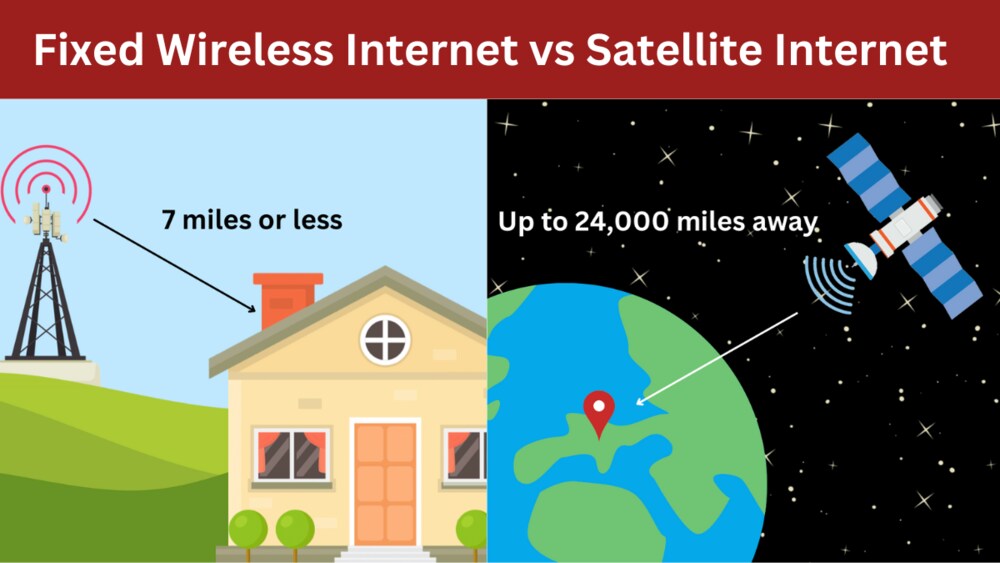
Satellite and fixed wireless internet are both wireless, but they differ significantly in operation and performance:
|
|
Fixed Wireless |
Satellite |
| Latency | Fixed wireless internet typically boasts lower latency than satellite internet because its signals travel shorter distances, usually within 10 miles. | Satellite signals travel from earth to space and back. |
| Data Caps | Fixed wireless providers tend to offer higher or no data caps.
|
Satellite providers often impose data limits to manage bandwidth on their networks, leading to reduced speeds once these caps are exceeded. |
| Installation | Fixed wireless equipment can usually be installed quickly and requires less sophisticated hardware. | Satellite dishes must be carefully aligned to communicate with orbiting satellites. |
| Weather Sensitivity | Fixed wireless systems are less affected as their signals travel over short distances.
|
Satellite connections can be more disrupted by weather conditions due to the lengthy travel of its signals
|
| Cost | Fixed wireless is terrestrial infrastructure | Satellite internet generally costs more than fixed wireless, reflecting the expense of launching and maintaining |
In the battle for the skies, fixed wireless often provides a more reliable, faster, and cost-effective solution, especially in regions not far from internet infrastructure, whereas satellite is generally the go-to option where ground-based networks are not available.
6. Challenges and Considerations of fixed wireless internet
Here is a breakdown of fixed wireless in terms of pros and cons. While it is a strong contender for those considering broadband options, especially in less urbanized areas, there are still drawbacks to consider.
| Advantages |
Disadvantages |
|
|
7. How much does fixed wireless cost?
Is Fixed Wireless Right for You?
To determine if fixed wireless internet meets your needs, consider these factors:
- Location: It’s a strong option if you’re in a remote or rural area with limited access to cable or fiber internet. Areas with clear line of sight to a provider’s tower benefit most.
- Internet Usage: If your online activities include browsing, streaming, or moderate data usage, fixed wireless can suffice. For high-speed demands like competitive gaming or extensive file uploads, verify if the available speed and latency align with your requirements.
- Weather Sensitivity: If your area experiences extreme weather, know that while fixed wireless is less sensitive than satellite, performance could still be affected.
- Data Cap Concerns: Fixed wireless often comes with higher or no data caps, a plus if you’re a heavy data user compared to satellite internet alternatives.
- Latency Needs: Activities like video conferencing or online gaming require low latency; check with local providers to ensure their service meets these needs.
Choosing fixed wireless could be a game-changer if you’ve been reliant on outdated dial-up or satellite connections, providing you with faster and more reliable internet access through an advanced internet modem.
Choosing fixed wireless could be a game-changer if you’ve been reliant on outdated dial-up or satellite connections, providing you with faster and more reliable internet access through an advanced internet modem.
Scenarios Where Fixed Wireless Shines: Powering Up Businesses
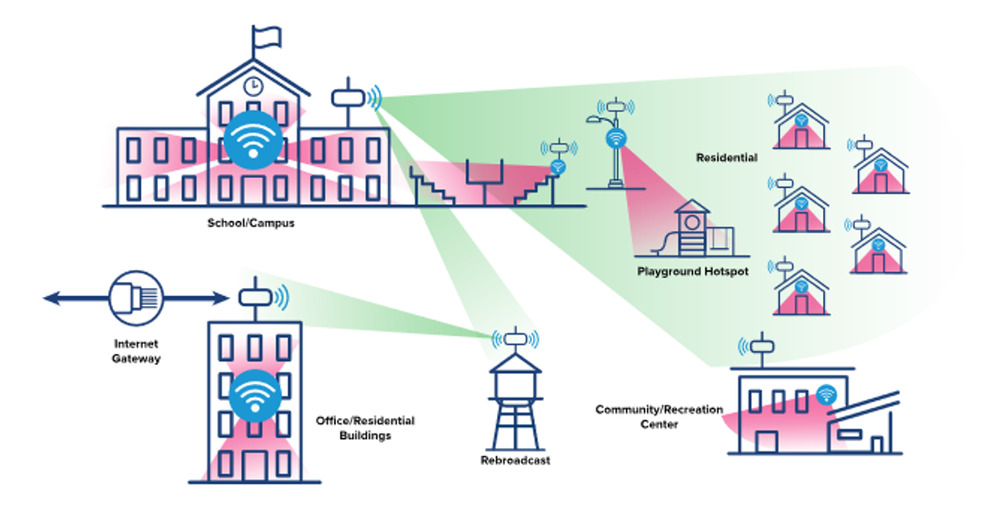
Fixed wireless internet particularly stands out in specific scenarios for businesses, offering indispensable benefits:
- Rural Business Operations: For businesses located in rural areas where cabled internet isn’t available, fixed wireless internet can provide the necessary connectivity to operate efficiently.
- Temporary Work Sites: Construction companies, event planners, and others who operate temporary work sites find fixed wireless internet ideal due to quick deployment and removal capabilities.
- Network Redundancy: Businesses can use fixed wireless as a backup option, ensuring continuous internet connectivity in case their primary wired connection fails.
- Remote Offices: Fixed wireless can efficiently connect satellite or branch offices to a company’s main network without the high costs associated with wired broadband extensions.
- IoT and Security: The technology is also perfect for powering Internet of Things (IoT) devices and security systems in remote locations where wired connectivity is a challenge.
With these applications, fixed wireless internet proves vital for business continuity, remote operations, and ensuring connectivity in diverse operational landscapes.
8. FAQ Section
What is fixed wireless access?
Fixed wireless access (FWA) is a broadband data communications method that uses radio signals to provide internet connectivity to users at specific, fixed locations, as opposed to mobile internet that is accessed by users in transit. It’s ideal for areas lacking fiber optic or cable infrastructure and has become increasingly popular for its ease of deployment and cost-effectiveness in providing high-speed internet connectivity.
Can the weather affect my fixed wireless internet connection?
Heavy storms, intense hail, and severe winds can potentially affect your fixed wireless internet connection, especially if they cause physical displacement or obstruction of your antenna. However, today’s fixed wireless systems are robust and designed to withstand most weather conditions. Service interruptions are rare thanks to the resilient infrastructure and self-healing networks utilized by providers.
What is 5G fixed wireless access
5G fixed wireless access (FWST) leverages the fifth-generation technology standard for cellular networks to provide high-speed internet services. With the capacity to offer faster data speeds, extremely low latency, and more reliability, 5G FWA is a promising alternative to traditional wired broadband, especially in underserved or hard-to-reach areas. It utilizes advanced wireless and antenna technology to deliver broadband connectivity directly to homes or businesses.
Are there any data caps or limits usually associated with fixed wireless internet?
Many fixed wireless internet providers offer plans with high or no data caps, particularly in comparison to satellite internet services. However, policies vary by provider, so it’s important to review the specific plan details to understand if any data limits apply and how they might affect usage and overage costs.






